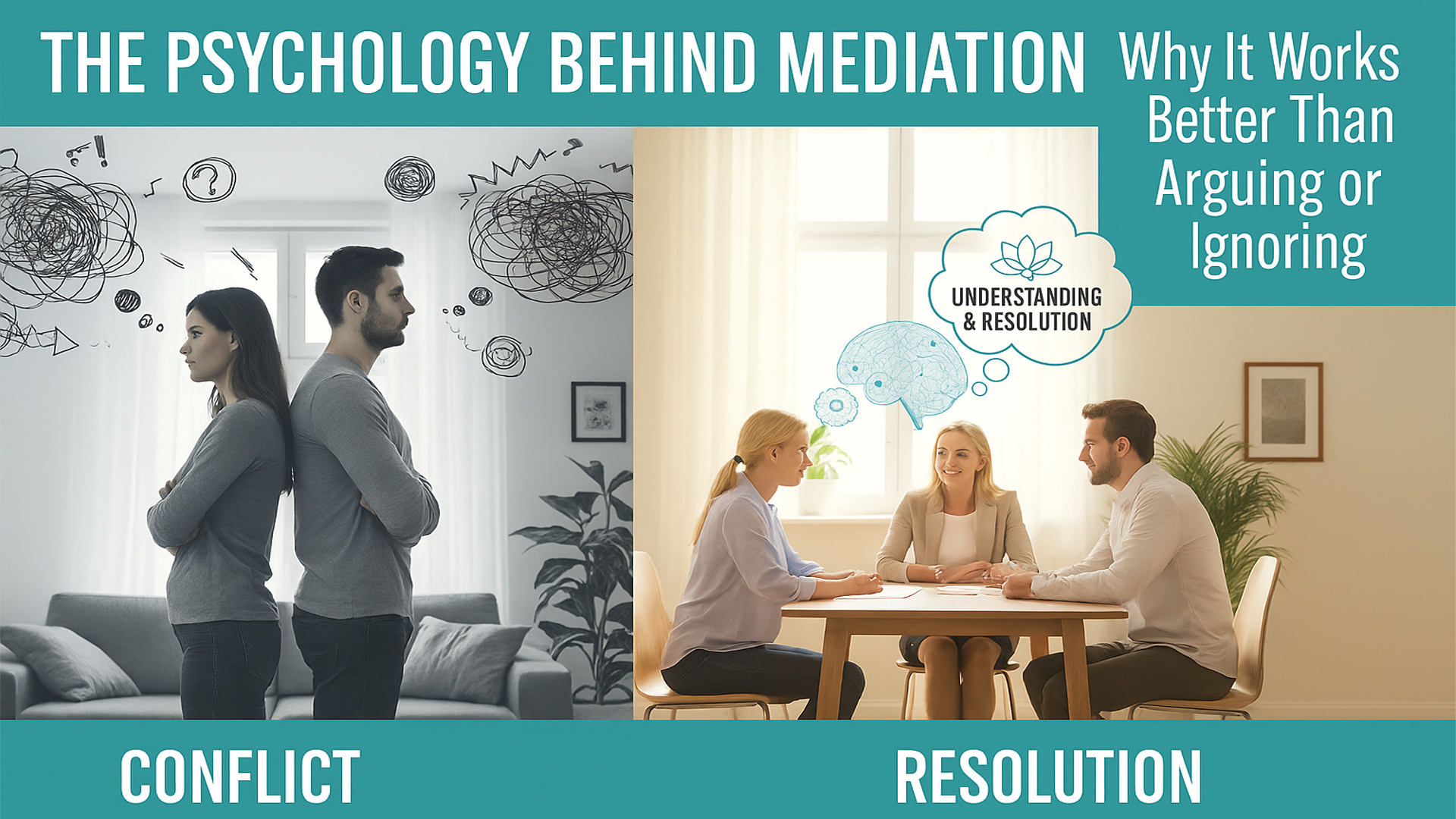When conflict hits, our instincts betray us.
It usually starts with a small disagreement, a misunderstanding, or just a clash of perspectives. Someone raises their voice. Someone else shuts down. And before long, the room fills with tension no one knows how to fix.
Most of us handle conflict the same way we either argue until we’re exhausted or avoid it altogether and hope it disappears.
But deep down, we know neither works. The argument never really ends, and the silence only makes the distance grow.
Mediation, however, is that quiet third option that feels almost too simple to work. Yet psychology says it’s the most effective one.
So, in this blog, we’ll explore what makes mediation so powerful, why it works when nothing else does, and how San Diego Family Mediation helps people move from constant tension to calm, constructive conversations.
Why Arguments Trigger the Wrong Brain Systems
When people argue, they think they’re solving the problem. But what’s actually happening is pure biology.
- The amygdala, your brain’s alarm system, fires up.
- Stress hormones flood your body, heart rate spikes, and your logical brain, the prefrontal cortex temporarily loses control.
- You stop listening to understand. You start listening to defend.
That’s why arguments feel like battles you’re not resolving, you’re surviving.
Mediation changes the brain’s chemistry of conflict. A trained neutral mediator slows the pace, controls tone, and builds a structure where people can speak without triggering fight-or-flight mode. Your logical brain can come back online.
So, arguing activates defense; mediation activates understanding.
Why Ignoring Problems Makes Them Worse
Avoidance looks peaceful, but it’s not.
It’s like putting a lid on boiling water.
You can’t see the steam, but it’s building pressure underneath.
- Unspoken words become passive-aggressive behavior.
- Little insults turn into a deep distance.
- Eventually, a tiny comment becomes the spark for a massive blow-up.
Mediation helps release that pressure safely. It Helps You Exhale What You’ve Been Holding In and creates a space where people can finally say what’s been unsaid and be heard without judgment.
Key takeaway: Ignoring builds emotional debt; mediation helps you pay it down before it costs you your peace.
Mediation: The Quiet Solution That Actually Works
Peace doesn’t come from avoiding conflict; it comes from learning how to handle it with grace.
Here’s why…
1. Mediation Creates Emotional Safety
People only speak truthfully when they feel emotionally safe. That’s the foundation of every successful mediation session. Mediation sessions are designed to:
- Lower emotional temperature with neutral facilitation
- Give each person equal speaking time, no interruptions
- Translate hurtful or charged words into manageable language
- Rebuild trust through guided, small disclosures
When that safety exists, something magical happens: People start listening, not just talking. That’s the real progress.
2. Psychological Ownership: Mediated Solutions Stick
Ever noticed how individuals are more dedicated to a thing they have been involved in creating? It is psychological ownership, and that is why mediation is a big reason why it works in the long term.
When individuals make their own agreements together, they feel invested. Their solution and not an imposed one.
But that is as opposed to a court order or one-sided demand compliance might be due to fear but not commitment. Ownership is achieved through mediation, and follow-through is achieved through ownership.
Result: The agreements formed out of a mediation process are more lasting since they are not enforced.
3. The Third-Party Effect: A Neutral Facilitator Changes Everything
When two people are stuck, they repeat the same cycle, the same arguments, the same silences.
A mediator breaks that loop. They act as a mirror and translator, reflecting what’s said, naming what’s unsaid, and reframing accusations into needs. Because the mediator doesn’t take sides
- Both people feel less threatened.
- Defensiveness drops.
- Understanding rises.
And suddenly, what felt impossible becomes negotiable.
4. From Conflict to Growth: The Post-Mediation Shift
The biggest win of mediation isn’t just resolution. It’s a transformation. After mediation, most people find themselves better equipped for future challenges because they’ve learned:
- How to use “I” statements and reflective listening
- How to address issues early instead of letting them rot
- How to read their emotional triggers
- How to focus on understanding instead of blaming
In short, mediation doesn’t just fix this problem. It teaches you how to handle the next one better.
Why Mediation Is the Smartest Way to End the Battle Without Breaking the Bond
We’ve all done it, talking to a friend, crying, shouting, or typing that long text you’ll probably delete. Venting feels good for a few minutes. But it is not a solution.
Once the rush is over, you are left with regrets or even further estrangement of the other individual.
In contrast, mediation will accommodate emotion but direct it. You have the freedom to say what you want, but in a manner that will result in resolution, not remorse.
1. Ignoring Problems = Emotional Debt
Consider all the unresolved issues as small emotional loans. It develops interest in the nature of tension, anxiety, or cold silence.
Mediation helps you clear that emotional debt with dignity.
You can identify what hurts and stop carrying it around like invisible baggage by acknowledging it. It’s never a sign of weakness. It’s emotional maturity.
2. Mediation vs. Court: The Human Advantage
Courts are black and white; they decide winners and losers. But real life? It’s shades of gray, filled with emotions, shared memories, and practical realities.
Mediation gives you the power to shape your own outcome, one that fits your reality, not just the law. It replaces confrontation with conversation, and resentment with relief. When people leave mediation, they don’t just walk away with a solution; they walk away with peace.
3. Meditation a way of Reducing Mental Overload with Structure
Conflict is exhausting. You’re managing emotions, memories, and fears all at once.
That’s called cognitive overload and that’s why conversations without structure always spiral.
Mediation brings that structure back:
- Turn-taking
- Focused agendas
- Summaries and checkpoints
- Step-by-step negotiation
This reduces mental clutter and keeps the conversation goal-oriented.
4. Trust Rebuilding Starts with Controlled Vulnerability by meditation
Trust doesn’t magically reappear. It’s rebuilt slowly and safely. Mediation creates that safe zone.
You can say things like “I felt hurt when” without being attacked for it.
Those small, brave moments of honesty when met with empathy rebuild the emotional bridge between people.
5. Why a Professional Mediator Matters
You can’t always talk it out with a friend or relative. They can be sympathetic, but they have biases and often take sides without realizing it.
A professional mediator brings:
- Neutrality
- Training in conflict psychology
- Awareness of power imbalances
- Techniques to de-escalate emotions
That combination of empathy and expertise is what helps people move from gridlock to growth.
Real-Life Examples of Mediation Success
Here’s what it looks like in real life:
- Divorcing parents build parenting schedules that protect their kids’ stability.
- Blended families set clear household expectations that everyone agrees on.
- Estate disputes turn into fair, respectful plans that preserve relationships.
- Post-divorce adjustments happen without going back to court.
Each scenario saves time, stress, and most importantly, relationships.
Mediation Doesn’t Erase the Past, It Helps You Rewrite the Future!
Conflict doesn’t always mean the end; it can be the beginning of something more genuine, more human. That is the point of mediation, when suffering collides with knowledge, when silence is transformed into a conversation, where two parties also recollect that they were never really enemies, just strangers without a voice.
In San Diego Family Mediation, we help you say the right words that make you feel better rather than angry, and find solutions that seem just instead of coercive. It is not necessary to fight to get ahead; you just need a secure environment to be heard.
Book your consultation, whether you’re a stressed parent because of your kids, or your partner starts showing red flags… no matter what, we have solutions.
FAQs
Q: Why choose San Diego Family Mediation instead of going to court?
A: Mediation will save your time, money, and emotional distress. You are in charge of the result rather than leaving it to a judge.
Q: What is the case where our situation is too complex to be mediated?
A: Mediation comes in when emotional issues are complicated, the blended family or the dispute that has lasted long, all can be safely managed with our qualified mediators, who take you through the process step by step, to relaxed, organized discussions.
Q: How soon can we start?
A: We provide flexible scheduling, usually in a couple of days.
Q: What if I’m nervous about seeing the other person face-to-face?
A: You’re not alone. We provide online mediation and shuttle mediation in order to allow both parties to share in a safe and comfortable way as they proceed to a resolution.
Q: What makes me know whether mediation is going to work with us?
A: In case you are willing to talk and even a little, mediation will work. Our mediators integrate empathy, structure, and experience to transform tension into understanding and disagreement.








